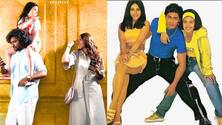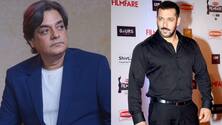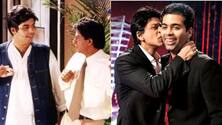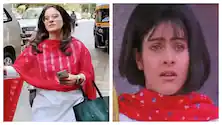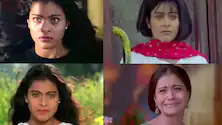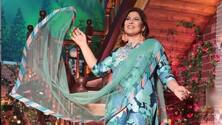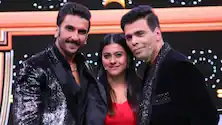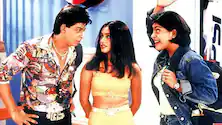By:
Faridoon
Shahryar,
IndiaFM
Monday,
August
13,
2007
Shahrukh
Khan
is
the
proverbial
outsider
who
has
made
it
Huge
in
the
big
and
complex
world
of
Hindi
Films.
In
spite
of
being
pitched
against
three
generation
of
superstars
he
continues
to
lord
over
the
Box
Office.
It
was
apt
for
Author/
Journalist
Anupama
Chopra
to
choose
him
as
the
pivotal
character
in
her
brilliant
book
King
of
Bollywood
Shahrukh
Khan
and
the
Seductive
World
of
Indian
Cinema
(Warner
Books)
where
she
chronicles
the
growth
of
Hindi
Films
industry
(popularly
known
as
Bollywood)
from
a
disorganized
murky
business
to
corporate
sophistication
through
the
life
and
times
of
one
of
its
biggest
stars
Shahrukh
Khan.
The
interesting
part
about
this
book
is
that
it
effortlessly
meshes
together
the
happenings
in
the
film
world
with
the
socio-political
and
economic
changes
in
the
country.
SRK
has
been
presented
as
the
symbol
of
a
new
modern
India
in
the
era
of
globalization
that
is
hungry
for
success
and
yet
remains
glued
to
the
ground
realities
of
family-n-friendships.
The
class-divide,
the
cultural
upheavals,
the
gradual
shift
from
poverty
to
relative
affluence
has
been
wonderfully
conjoined
with
the
growth
of
SRK,
the
struggling
actor
who
got
a
three
scene
obsolete
role
in
Pradip
Kishan's
In
Which
Annie
Gives
It
Those
Ones,
becomes
nation's
rage
with
his
first
TV
serial
Fauji,
enters
films
and
becomes
the
biggest
draw
at
the
ticket
window.
Chopra
in
an
uncharacteristic
manner
starts
off
with
the
story
of
Bhavesh
Sheth,
a
portly
spectacled
fan
who
danced
with
SRK
during
the
Temptations
Tour
in
2005
in
US.
Sheth's
admiration
and
reverence
for
Khan
symbolizes
the
global
icon
that
Shahrukh
Khan
has
become
over
the
years.
In
a
surprising
move,
after
the
first
chapter
Bollywood
Dreams,
the
author
traces
the
roots
of
this
big
superstar
in
the
next
chapter
Peshawar:
The
Street
of
the
Storytellers,
to
small
gullies
of
Peshawar
in
Pakistan
where
his
father
Meer
Taj
Mohammad
was
born
(ironically,
Dilip
Kumar
and
Prithviraj
Kapoor
belonged
to
Peshawar
as
well).
Chopra
with
her
riveting
style
binds
the
interest
as
Meer
an
upright
freedom
fighter
makes
a
tumultuous
journey
from
Pakistan
to
India
after
1947
as
the
train
of
humanity
burned
on
the
pyre
of
hatred.
It
is
worthy
of
note
that
Shahrukh
Khan's
dad
made
a
half
hearted
attempt
in
films
(the
father-son
duo
have
an
uncharacteristic
similarity)
and
in
a
typical
filmi
style
he
pulled
out
his
would-be
wife
Fatima
Latif
from
an
accident
site
and
gave
her
his
own
blood.
Here
one
must
note
that
as
you
get
engrossed
in
reading
the
book,
you
can
notice
that
it
moves
almost
like
a
film
script
as
the
visuals
keep
flashing.
The
writer
has
based
her
narrative
on
exhaustive
interviews
that
she
has
conducted
with
Shahrukh
Khan
and
lots
of
people
related
with
him
whom
she
has
credited
at
the
end.
The
obvious
question
that
one
may
ask
is
that,
is
it
a
biography?
Well,
yes
and
no.
It
is
a
biography
because
it
tells
the
story
of
Shahrukh
Khan
from
the
times
when
he
wasn't
even
born,
till
today.
But
then
one
realizes
it
is
more
than
a
biography.
It
is
actually
a
comment
on
the
varied
changes
in
India
and
Bollywood
(which
it
seems
is
the
mirror
that
portrays
the
picture
of
change
happening
in
the
country).
Like
for
example,
the
parallel
between
birth
of
SRK
in
1965
in
a
lower
middle
class
family
and
the
humungous
ascendance
of
Amitabh
Bachchan
in
the
1970s
makes
for
gripping
reading.
For
a
couple
of
decades
later
both
were
pitched
against
each
other
as
to
who
the
bigger
Don
in
the
Hindi
Films
is.
The
two
biggest
events
that
altered
SRK
are
the
untimely
deaths
of
his
parents
at
relatively
young
age.
Chopra
sensitively
delves
into
the
most
horrendous
times
in
the
chapter
Life
after
Death
that
proved
as
turning
points
in
Khan's
life.
He
had
nothing
left
to
do
except
hoping
to
make
it
big
in
the
world
of
films.
His
love
story
with
Gauri
was
another
ordeal
for
it
took
a
couple
of
years
for
the
lady
to
accept
his
proposal.
The
author's
details
of
Khan
finding
Gauri
on
the
far
flung
Gorai
Beach
in
Mumbai
are
straight
out
of
a
Hindi
film.
It
makes
for
amorous
reading
though.
Several
chapters
in
the
book
are
spent
on
Shahrukh's
transition
from
being
a
television
star
to
a
big
movie
star
in
spite
of
his
unconventional
looks
and
no
filmi
connections,
how
the
second
lead
in
Deewana
and
last
choice
roles
of
Baazigar
and
Darr
made
him
a
name
to
be
reckoned
with.
But
one
knows
most
of
this
stuff
as
it
is
part
of
the
folk
lore.
It's
when
Mobsters
and
Movies
starts
off
on
an
ominous
note
of
underworld
ringing
in
havoc
in
the
film
world
that
you
read
on
unabated.
Once
again
the
author
details
the
circumstances
that
lead
to
the
rise
of
underworld
in
Bollywood,
the
chills
that
Gulshan
Kumar's
cold
blooded
murder
sent
down
the
film
fraternity
and
then
SRK
received
his
first
call
from
Abu
Salem,
"Haan
kya
chal
raha
hai".
Khan
had
been
warned
by
senior
police
officer
Rakesh
Maria
that
he
is
on
the
hit
list
of
underworld
and
SRK
was
amongst
the
first
few
from
the
film
industry
to
have
been
provided
by
police
protection.
The
insecurity
of
the
big
star
when
faced
with
the
looming
underworld
or
when
a
new
star
in
Hrithik
Roshan
is
said
to
have
usurped
him
has
been
poignantly
presented
by
Chopra.
In
fact
these
passages
are
so
engrossing
that
you
can
hear
the
soundtrack
of
life
playing
in
your
ears
as
the
visuals
dissolve
from
one
to
another.
There
are
times
when
you
feel
that
Chopra
is
presenting
things
from
SRK's
angle
but
she
also
balances
by
objectively
assessing
his
failures
(especially
the
debacle
called
Phir
Bhi
Dil
Hai
Hindustani)
and
the
adverse
feedback
to
the
Pepsi
ad
that
showed
a
Hrithik
look-alike
with
braces
being
made
fun
of.
In
all,
it's
a
well
rounded
package
that
entertains
you
with
its
zestful
pace.
The
author
obviously
likes
the
Raj-Rahul
phenomenon
associated
with
Shahrukh
Khan
and
it
seems
she
is
endorsing
his
point
of
view
when
she
says,
"In
2005
alone,
he
endorsed
approximately
34
different
products.
Shah
Rukh
was
the
ubiquitous
symbol
and
conduit
of
the
new
consumerist
society."
Anupama
Chopra's
writing
style
is
simple,
informative,
engrossing
and
at
no
point
of
time
she
tries
hard
to
grab
attention.
It
just
flows.
The
only
eye
sore
of
the
book
is
the
attempt
at
translating
some
of
the
Hindi
film
names
to
English.
How
would
you
react
when
you'd
see
the
following:
Maine
Pyaar
Kiya
(I
Have
Loved),
Hum
Aapke
Hain
Kyun
(Who
Am
I
To
You?),
Dil
To
Pagal
Hai
(The
Heart
is
Crazy)
and
Kuch
Kuch
Hota
Hai
(Something
is
Happening)?
Lost
in
translation,
isn't
it!
One
of
the
reasons
that
makes
this
book
special
is
some
rare
pictures
of
Shahrukh's
family,
his
TAG
theatre
days
but
the
one
that
stands
out
is
a
twenty
year
old
scrawny
Shahrukh
holding
Gauri
by
her
elbow.
When
you
see
this
picture
you
realize
it
has
really
been
a
long
road
for
this
man
from
the
by-lanes
of
Okhla
in
Delhi
to
the
realization
of
his
Mannat
at
Bandra
Bandstand.
The
fairy
tale
continues....
King
of
Bollywood
Shahrukh
Khan
and
the
Seductive
World
of
Indian
Cinema:
A
must
buy
for
anyone
who
wants
a
better
perspective
on
the
workings
of
Hindi
Films.




 Click it and Unblock the Notifications
Click it and Unblock the Notifications




